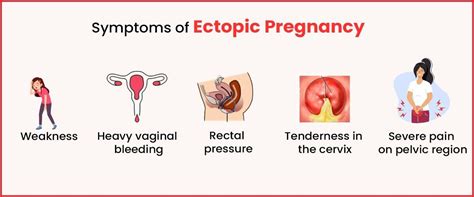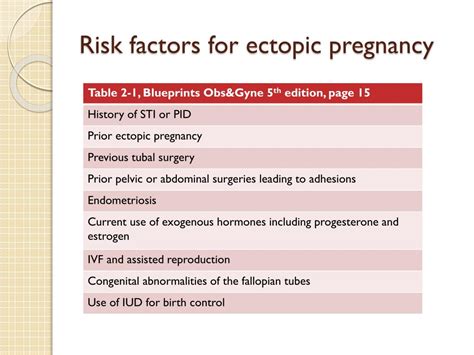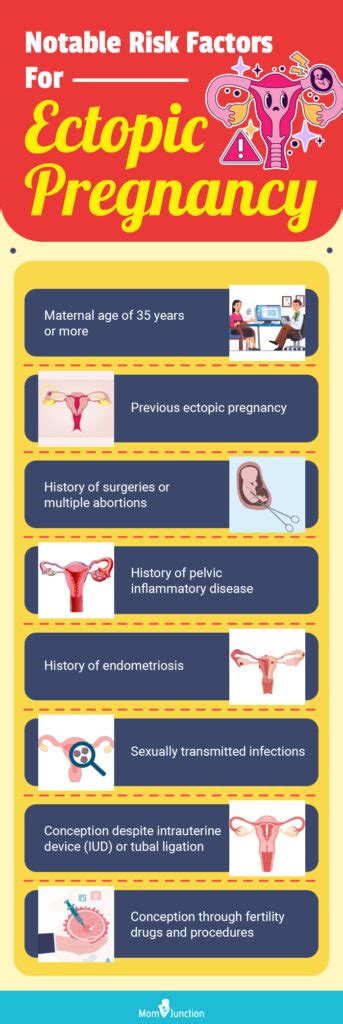Intro
Learn ectopic pregnancy signs and symptoms, including abdominal pain, vaginal bleeding, and missed periods, to recognize this life-threatening condition and seek medical help promptly, understanding its causes, diagnosis, and treatment options for a healthy recovery.
An ectopic pregnancy is a serious and potentially life-threatening condition that occurs when a fertilized egg implants outside of the uterus, often in the fallopian tube. This type of pregnancy is not viable and can cause significant health risks to the mother if left untreated. Understanding the signs and symptoms of an ectopic pregnancy is crucial for early detection and treatment. In this article, we will delve into the importance of recognizing the signs and symptoms of an ectopic pregnancy, and provide a comprehensive guide on what to look out for.
The importance of recognizing the signs and symptoms of an ectopic pregnancy cannot be overstated. Early detection is key to preventing serious health complications and ensuring the best possible outcome for the mother. According to the American Pregnancy Association, approximately 1 in 50 pregnancies are ectopic, and the condition is a leading cause of maternal mortality in the first trimester. By being aware of the signs and symptoms of an ectopic pregnancy, women can seek medical attention promptly, reducing the risk of serious health consequences.
Ectopic pregnancies can be asymptomatic in the early stages, making it essential to be aware of the potential signs and symptoms. Women who are at risk of an ectopic pregnancy, such as those with a history of pelvic surgery, infertility, or previous ectopic pregnancy, should be particularly vigilant. In addition, women who experience any unusual symptoms during early pregnancy should seek medical attention immediately. By being proactive and informed, women can take control of their reproductive health and reduce the risk of complications associated with an ectopic pregnancy.
Ectopic Pregnancy Signs and Symptoms

The signs and symptoms of an ectopic pregnancy can vary from woman to woman, but common indicators include pelvic pain, vaginal bleeding, and abdominal tenderness. In some cases, women may experience shoulder pain, nausea, and vomiting, as well as dizziness and fainting. It is essential to seek medical attention immediately if any of these symptoms occur, as prompt treatment can help prevent serious health complications.
Common Signs and Symptoms of Ectopic Pregnancy
Some common signs and symptoms of an ectopic pregnancy include: * Pelvic pain: A sharp, stabbing pain in the pelvic area that can radiate to the abdomen and lower back * Vaginal bleeding: Light to heavy bleeding that can be accompanied by clotting * Abdominal tenderness: Tenderness and sensitivity in the abdominal area * Shoulder pain: Pain in the shoulder and neck area, often caused by internal bleeding * Nausea and vomiting: Morning sickness that can be severe and persistent * Dizziness and fainting: Feeling lightheaded and faint, often due to blood lossRisk Factors for Ectopic Pregnancy

Several risk factors can increase the likelihood of an ectopic pregnancy. These include:
- Previous ectopic pregnancy: Women who have had a previous ectopic pregnancy are at higher risk of experiencing another
- Pelvic surgery: Women who have undergone pelvic surgery, such as a cesarean section or tubal ligation, are at higher risk
- Infertility: Women who have experienced infertility or have undergone fertility treatments are at higher risk
- Pelvic inflammatory disease (PID): Women who have a history of PID are at higher risk
- Age: Women over 35 years old are at higher risk of an ectopic pregnancy
Reducing the Risk of Ectopic Pregnancy
While some risk factors cannot be changed, there are steps that women can take to reduce their risk of an ectopic pregnancy. These include: * Practicing safe sex: Using condoms and other forms of birth control can help reduce the risk of unintended pregnancy and ectopic pregnancy * Getting regular check-ups: Regular gynecological check-ups can help identify any underlying health issues that may increase the risk of ectopic pregnancy * Maintaining a healthy weight: Excess weight can increase the risk of ectopic pregnancy, so maintaining a healthy weight through a balanced diet and regular exercise is essential * Avoiding smoking: Smoking can increase the risk of ectopic pregnancy, so quitting smoking is crucial for reproductive healthDiagnosing Ectopic Pregnancy

Diagnosing an ectopic pregnancy can be challenging, as the symptoms can be similar to those experienced during a normal pregnancy. However, there are several tests and procedures that can help diagnose an ectopic pregnancy. These include:
- Pelvic exam: A pelvic exam can help identify any abnormalities in the pelvic area
- Ultrasound: An ultrasound can help confirm the presence of a pregnancy and identify any abnormalities in the uterus or fallopian tubes
- Blood tests: Blood tests can help measure the levels of human chorionic gonadotropin (hCG) in the blood, which can be abnormal in an ectopic pregnancy
- Laparoscopy: A laparoscopy can help visualize the pelvic area and confirm the diagnosis of an ectopic pregnancy
Treatment Options for Ectopic Pregnancy
Treatment for an ectopic pregnancy depends on the severity of the condition and the overall health of the mother. In some cases, treatment may involve: * Medication: Medication can be used to stop the growth of the embryo and reduce the risk of rupture * Surgery: Surgery may be necessary to remove the embryo and repair any damage to the fallopian tube * Expectant management: In some cases, the ectopic pregnancy may be monitored closely, and treatment may not be necessary until the embryo is absorbed by the bodyPreventing Future Ectopic Pregnancies

While some risk factors cannot be changed, there are steps that women can take to reduce their risk of future ectopic pregnancies. These include:
- Practicing safe sex: Using condoms and other forms of birth control can help reduce the risk of unintended pregnancy and ectopic pregnancy
- Getting regular check-ups: Regular gynecological check-ups can help identify any underlying health issues that may increase the risk of ectopic pregnancy
- Maintaining a healthy weight: Excess weight can increase the risk of ectopic pregnancy, so maintaining a healthy weight through a balanced diet and regular exercise is essential
- Avoiding smoking: Smoking can increase the risk of ectopic pregnancy, so quitting smoking is crucial for reproductive health
Coping with an Ectopic Pregnancy
Coping with an ectopic pregnancy can be emotionally challenging, and it is essential to seek support from healthcare providers, family, and friends. Women who have experienced an ectopic pregnancy may benefit from: * Counseling: Counseling can help women process their emotions and come to terms with their experience * Support groups: Support groups can provide a safe and supportive environment for women to share their experiences and connect with others who have gone through similar situations * Self-care: Practicing self-care, such as getting enough rest, eating a balanced diet, and engaging in regular exercise, can help women cope with the physical and emotional demands of an ectopic pregnancyWhat are the symptoms of an ectopic pregnancy?
+The symptoms of an ectopic pregnancy can include pelvic pain, vaginal bleeding, abdominal tenderness, shoulder pain, nausea, and vomiting, as well as dizziness and fainting.
How is an ectopic pregnancy diagnosed?
+An ectopic pregnancy can be diagnosed through a combination of tests and procedures, including a pelvic exam, ultrasound, blood tests, and laparoscopy.
What are the treatment options for an ectopic pregnancy?
+Treatment for an ectopic pregnancy depends on the severity of the condition and the overall health of the mother, and may involve medication, surgery, or expectant management.
In
Final Thoughts

